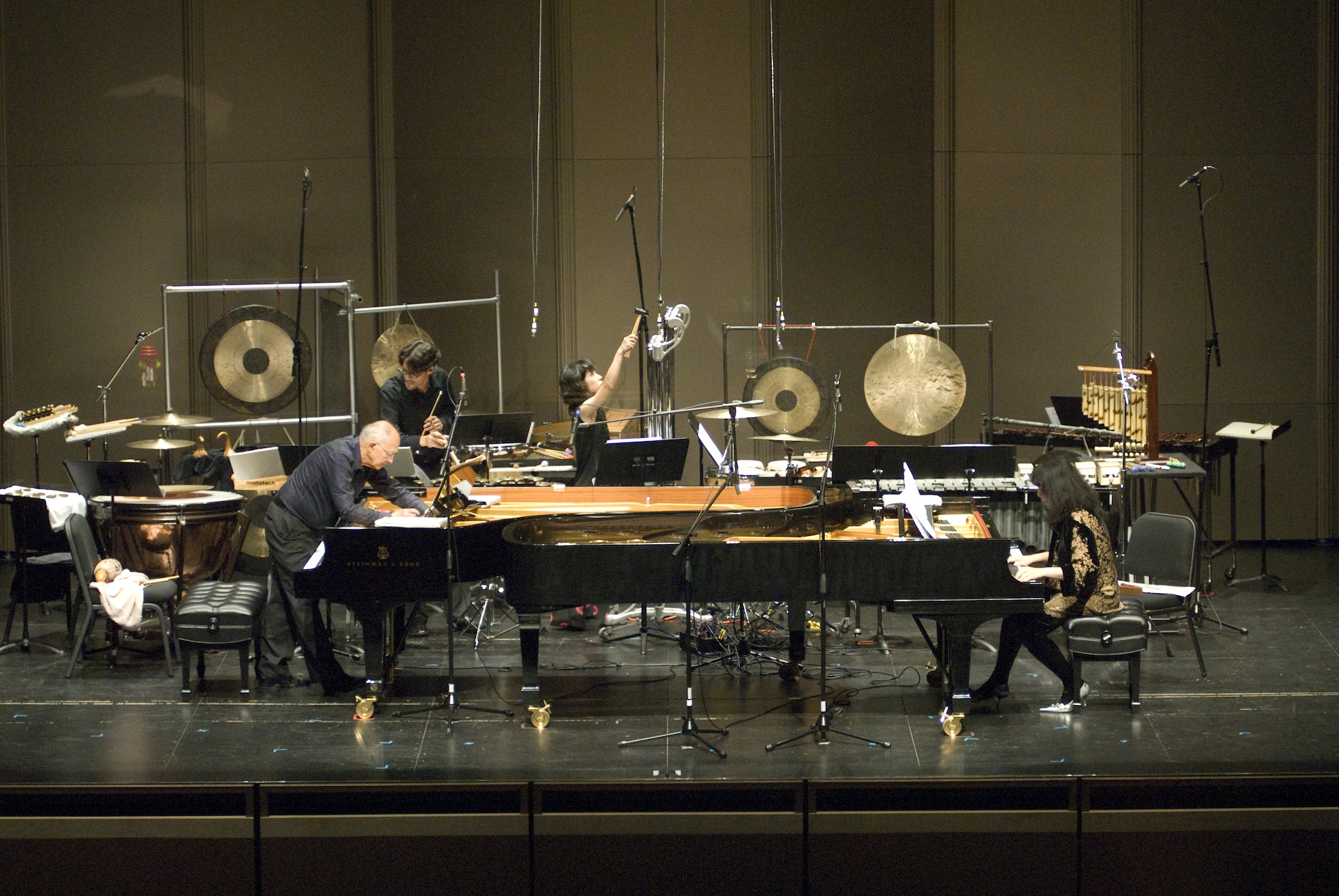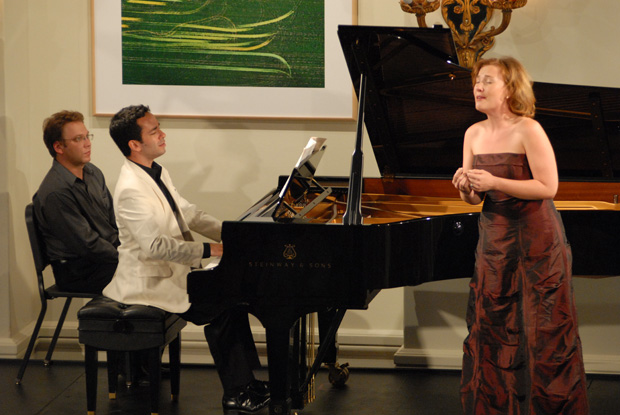Music@Menlo opens with contrasted programs like night and day

Pianist Gilbert Kalish and Wu Han and percussionists Ayano Kataoka and Christopher Froh in George Crumb's "Music for a Summer Evening." Photo: Tristan Cook.
Concert presenters strive hard to create context. Most come out as contrived marketing schemes: “Mahler’s Misery” or “The Secret Life of Shostakovich.”
But festivals, like Music@Menlo, which runs through August 14 at various locations on the peninsula south of San Francisco, offer a chance to wrap musical performances in a detailed, sophisticated embrace of ideas. With additional time to offer lectures, master classes, and adjunct concerts, Music@Menlo conjures a genuine intellectual atmosphere for devoted music fans.
“Maps and Legends” comprises Menlo’s theme this season, and besides being a clever pun, it offers an integrated basis for the eight main-stage programs. On the opening weekend the first two presentations, “The Seasons” on Friday evening and “English Voices” Sunday, got the festival, now in its 8th season, off to a fast start.
“The Seasons” could have been alternatively titled “Day and Night,” because Vivaldi’s Four Seasons is definitely music of the daylight, and George Crumb’s fascinatingly moody Music for a Summer Evening is equally identified with the dark.
Members of the Miro Quartet supported four diverse soloists in Vivaldi’s four concertos, which may be universally familiar but can still be electrifying in performance. Erin Keefe, Ani Kavafian, Philip Setzer and Ian Swensen produced solo readings as different as the seasons themselves. Keefe gave Spring an even-handed, almost conductorly treatment. Kavafian, as compelling as ever, jolted Summer (as well as fellow performers and audience members) into life. Setzer gave an articulate and stately look at Autumn that would have made one of his mentors, Oscar Shumsky proud. And Ian Swensen nearly tore the roof off the new Center for the Performing Arts at Menlo-Atherton with a howling rendition of Winter. Like Yo-Yo Ma and Gil Shaham, Swensen is one of those performers whose demonstrative style comes from the heart, and not from some misbegotten sense of showmanship. It’s a lesson for all young musicians, like the many gathered here at the Menlo teaching institute.
If anyone ever disagrees that the piano is a percussion instrument, Crumb’s Music for a Summer Evening would quickly set them straight.
Written in 1974 as part of Crumb’s Makrokosmos suite, the work is set for two pianists (Gilbert Kalish and Wu Han) on prepared instruments and two hectically occupied percussionists (Ayano Kataoka, Christopher Froh). As Crumb himself has noted, it is curious that more composers have not taken advantage of this instrumentation, used first by Bartok in his own Sonata (1937). Crumb follows Bartok not only superficially, with the instrumentation, but in a more sophisticated sense, building Music for a Summer Evening around groups of musical cells.
Five extensive movements all project the same mood: dark in texture but not noirish or foreboding in any way. Short motives are passed around the quartet, with more extensive development by the percussionists, who work with an extensive kit including vibes, xylophone, tubular bells, crotales, tam tams, and a vast set of timpani and gongs. Rhythmic shouting punctuates some sections. An occasional ostinato provides some listening context, not quite a “groove” but something for audiences to latch on to.
But while the work moves almost restlessly from one idea to the next, in a sound world entirely of Crumb’s invention, the atmosphere remains steady, recognizable. It’s a brilliant work that requires brave performers, especially at the piano (Kalish, one of the work’s dedicatees, seemed the unacknowledged leader of the performance). Together, the altogether familiar Four Seasons and the uncharted Music for a Summer Evening opened the festival in terrific style.
The second program, “The English Voice,” had a firm intellectual component. Nicknamed “Mind the Gap” by R. Larry Todd in his preconcert Encounter presentation, the program, with Britten songs, a Walton quartet and an Elgar quintet, strove to demonstrate a resurgence in 20th century English composition after a long period of irrelevance.
The proof was in the performance. Britten songs have their own language, and good interpreters are a joy, as was the case with soprano Sasha Cooke, singing A Charm of Lullabies. Dramatic, with a facile and inviting vibrato, Cooke has a booming upper range that raises chills. She produced these five settings with clarity and a keen sense of theater.
The Walton piano quartet, with festival directors Wu Han and cellist David Finckel joined by Kavafian and violist Lily Francis showed a mature side of English chamber music that deserves more exploration. Mature music to the ear, but created by a teenage Walton, showing a remarkable capacity to prefigure his century’s incorporation of jazz and rhythmic uncertainties. A blast of energy envelopes all four players equally, and the performance—driven by a supercharged Wu Han—was top-flight.
So too was the Miro Quartet’s reading of the Elgar quintet, aided by the flamboyant pianist Inon Barnatan, who had accompanied Cooke in the Britten songs. Elgar was much older of course, but was composing his quintet about the same time as Walton was working on his quartet. The similarity ends there though; Walton’s quartet bears almost nothing of the past repertory, while Elgar’s quintet, built on bold and fervently shifting dynamics, casts a cold stare at the past, particularly similar settings by Brahms. As a set, the three works showed a vigorous side of 20th century British composition that cannot be ignored. There may have been a gap in the English compositional voice, but there is no longer.
Upcoming programs at Menlo include a look at the post World War II music of Strauss and Shostakovich, Paris in the 1920s (Anthiel, Ravel, and Gershwin) and Dvorak’s America.
Music@Menlo runs through August 14. For tickets and information call 650-331-0202 or visit www.musicatmenolo.org.
